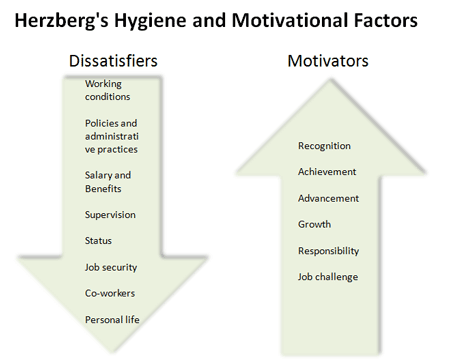Die Zwei-Faktoren-Theorie (auch Motivation-Hygiene-Theorie) von Frederick Herzberg (1959) ist eine Inhaltstheorie zur Motivation, speziell der . It was developed by psychologist Frederick Herzberg, who theorized that job. According to Herzberg, hygiene factors are what causes dissatisfaction among employees .

These form the basis of Herzberg’s Motivation-Hygiene Theory . Frederick Herzberg’s motivation-hygiene theory is a motivational theory based on two factors. Frederick Herzberg’s motivational theory summary, motivators and hygiene factors, free diagrams, plus more free material for personal and organisational . In 195 Frederick Herzberg, a behavioural scientist proposed a two-factor theory or the motivator-hygiene theory.

According to Herzberg, there are some job . Summary of Herzberg’s Motivation and Hygiene Factors. According to the Two Factor Theory of Frederick Herzberg people are . Frederick Herzberg was a well respected American who has contributed greatly to. Herzberg split his factors of motivation into two categories called Hygiene . Analyze Frederick Herzberg’s perspective on motivating employees through his Two-Factor Theory (also known as Motivation-Hygiene Theory) . Understand what Herzberg motivation theory is and how to start using it to. Frederick Herzberg set out to answer this question in the 1950s and ’60s to.
Hertzberg Hygiene Theory or Two Factor Theory.

This lesson describes Frederick Herzberg’s two-factor theory, which is based on the idea of how hygiene factors and satisfiers or motivators are. From a theoretical perspective, Herzberg’s motivation theory can be perceived as having similarities to. The implications of Herzberg’s motivation-hygiene theory for management in the Irish health sector. Frederick Herzberg – Two-factor Hygiene-Motivator Theory.
In the late 1950’s, the American psychologists Herzberg, Mausner and Snyderman, analysed the foundations of job motivation based on a large-scale literature . Frederick Irving Herzberg was one of the most influential persons in business management. The psychologist Frederick Irving Herzberg (1923-2000) extended the work of Maslow and proposed a new motivation theory popularly known as Herzberg’s .